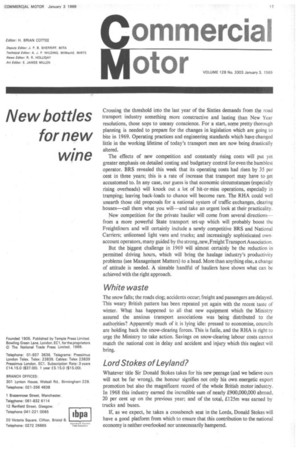New bottles for new wine
Page 19

If you've noticed an error in this article please click here to report it so we can fix it.
Crossing the threshold into the last year of the Sixties demands from the road transport industry something more constructive and lasting than New Year resolutions, those sops to uneasy conscience. For a start, some pretty thorough planning is needed to prepare for the changes in legislation which are going to bite in 1969. Operating practices and engineering standards which have changed little in the working lifetime of today's transport men are now being drastically altered.
The effects of new competition and constantly rising costs will put yet greater emphasis on detailed costing and budgetary control for even the humblest operator. BRS revealed this week that its operating costs had risen by 35 per cent in three years; this is a rate of increase that transport may have to get accustomed to. In any case, our guess is that economic circumstances (especially rising overheads) will knock out a lot of hit-or-miss operations, especially in tramping; leaving back-loads to chance will become rare. The RHA could well unearth those old proposals for a national system of traffic exchanges, clearing houses—call them what you will—and take an urgent look at their practicality.
New competition for the private haulier will come from several directions— from a more powerful State transport set-up which will probably boost the Freightliners and will certainly include a newly competitive BRS and National Carriers; unlicensed light vans and trucks; and increasingly sophisticated ownaccount operators, many guided by the strong, new, Freight Transport Associ ation.
But the biggest challenge in 1969 will almost certainly be the reduction in permitted driving hours, which will bring the haulage industry's productivity problems (see Management Matters) to a head. More than anything else, a change of attitude is needed. A sizeable handful of hauliers have shown what can be achieved with the right approach.
White waste
The snow falls; the roads clog; accidents occur; freight and passengers are delayed. This weary British pattern has been repeated yet again with the recent taste of winter. What has happened to all that new equipment which the Ministry assured the anxious transport associations was being distributed to the authorities? Apparently much of it is lying idle: pressed to economise, councils are holding back the snow-clearing forces. This is futile, and the RHA is right to urge the Ministry to take action. Savings on snow-clearing labour costs cannot match the national cost in delay and accident and injury which this neglect will bring.
Lord Stokes of Leyland?
Whatever title Sir Donald Stokes takes for his new peerage (and we believe ours will not be far wrong), the honour signifies not only his own energetic export promotion but also the magnificent record of the whole British motor industry. In 1968 this industry earned the incredible sum of nearly £900,000,000 abroad, 20 per cent up on the previous year; and of the total, £125m was earned by trucks and buses.
If, as we expect, he takes a crossbench seat in the Lords, Donald Stokes will have a good platform from which to ensure that this contribution to the national economy is neither overlooked nor unnecessarily hampered.




























































































